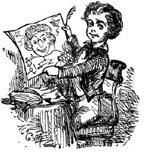
Is Adulthood in America Dead?
This question has been on the mind of New York Times film critic A.O. Scott, who has written a searching essay about the cultural degeneration of adulthood, and its depiction in pop culture (Sept. 11), with particular emphasis on the conclusion of the TV series Mad Men. Why should this bit of pop-culture ephemera command our attention? Because television characters, Scott writes, “are among the allegorical figures of our age, giving individual human shape to our collective anxieties and aspirations.” In Mad Men, a period drama about the Madison Avenue advertising industry of the 1960s, we get a glimpse of “an old order collapsing under the weight of internal contradiction and external pressure.” If one word could define that old order, says Scott, it would be patriarchy, the “slow unwinding” of which has been “the work of generations.”
Scott tells us that this unwinding is part of a “narrative of progress” — one that has liberated women and created a “freer and more open” society. While that’s a highly debatable assertion, he also tells us that, in “doing away with patriarchal authority, we have also, perhaps unwittingly, killed off all the grown-ups.”
As a film critic for the past decade and a half, Scott has watched as movie studios “committed their vast financial and imaginative resources to the cultivation of franchises” that “advance an essentially juvenile vision of the world.” Tales of “adolescent heroism and comedies of arrested development” are not only “the commercial center” of Hollywood, they are its “artistic heart.” And so the studios regularly serve up films like The Hangover, Forty-Year-Old Virgin, Knocked Up, and Neighbors.
Meanwhile, on the small screen, the offerings not only herald the “end of male authority” but also the “erosion of traditional adulthood in any form.” What shows like Broad City, Masters of Sex, The Simpsons, and Bob’s Burgers all “grasp at,” says Scott, “is that nobody knows how to be a grown-up anymore. Adulthood as we have known it has become conceptually untenable.”
You May Also Enjoy
Free Speech Movement of the 1960s-era was about civil rights. Nowadays, it's about broadcasting the "s-word" and the "f-word."
The current identification of the Christian life with consumerism, suburban aspirations, and a gamut of other materialistic concerns denies the incarnation — makes it incredible.
Springsteen describes a difficult, often lonely America, yet he is an idealist speaking of plain virtues — strength of will, hard work, generosity.

